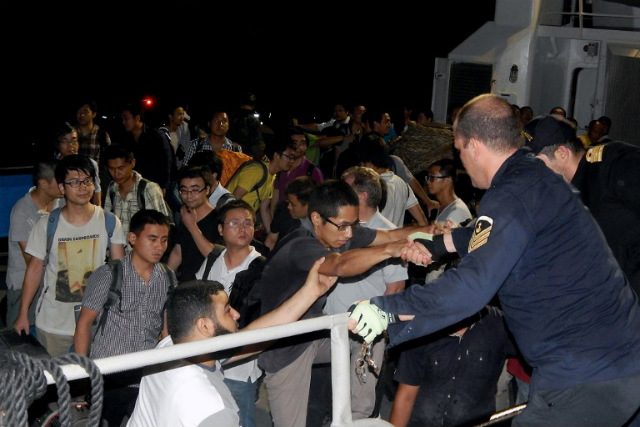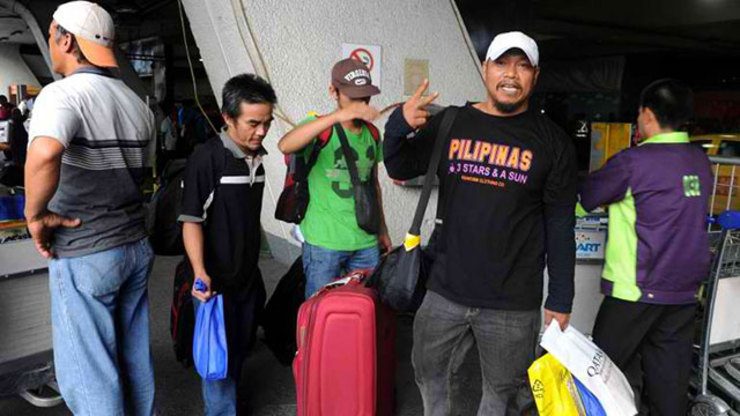SUMMARY
This is AI generated summarization, which may have errors. For context, always refer to the full article.

MANILA, Philippines – Fearing joblessness, more than 11,000 Filipinos choose to remain in Libya even as a 1,500-seater ship is set to ferry them by Friday, August 8, out of the country at the brink of civil war.
Citing reports on Filipinos who refuse repatriation, Philippine Department of Foreign Affairs (DFA) spokesman Charles Jose said on Monday, August 4: “They would rather take the chance. They think they have a greater chance of surviving the war, rather than surviving the uncertainty of being without any work here.”
The 13,000 Filipinos in Libya comprise around 0.59% of the 2.2 million Filipinos forced to work abroad, as of 2013, largely due to the lack of jobs in the Philippines. (INFOGRAPHIC: Getting to know the OFWs)
Jose added that medical workers in Libya feel “pressure from hospitals,” because 60% of the country’s hospital staff, or around 3,000 health workers, come from the Philippines.
“If all of them leave, that will paralyze Libya’s medical services. So they are asking Filipino medical workers to stay,” Jose told reporters in a mix of English and Filipino. (READ: Libya hospitals face collapse if Filipino staff flee)
Because of these factors, only around 800 of the 13,000 Filipinos in Libya have returned to the Philippines even if the Philippine government ordered all of them to evacuate.
Jose said around 200 others have sought repatriation. (READ: Libya waives exit visas for Filipinos: ‘No need to beg’)
‘Sensitive’ to workers’ needs
During Monday’s media briefing, Jose said the 1,500-seater ship contracted by the Philippine government will arrive in Libya from Malta either by Thursday, August 7, or Friday, to pick up the Filipinos willing to be repatriated.
The ship should be back in Malta by Sunday, August 10, Jose said, as it takes 24 hours to travel between Malta and Libya.
He added that initially, the Philippine government projects a one-time trip, but if the repatriates exceed 1,500, “then maybe we can arrange for subsequent trips.”

He explained the Philippine government is “sensitive” to the overseas Filipino workers’ (OFWs) demands.
Jose said: “If it were all up to us, we would like every Filipino there to be out. But despite our mandatory repatriation, it’s still their decision whether or not they would like to come back or stay behind.”
He assured the public, in any case, of “continuous” efforts to convince Filipinos in Libya “to avail themselves of the repatriation program.” “We’ll find ways,” he said.
13,500 evacuated before but…
Jose noted that during the Libyan unrest that toppled dictator Moammar Gaddafi in 2011, up to 13,500 Filipino workers fled Libya
Up to 9,000 of them returned, and 4,000 went there as new hires, after the Philippines lifted its deployment ban over the strife-torn country.
Residents now fleeing Libya, however, said the country is descending into a civil war that is “much worse” than the unrest that unseated Gaddafi.
“We have gone through (war) before, with Gaddafi, but now it’s much worse,” Paraskevi Athineou, a Greek woman living in Libya, told Agence France-Presse.
“Chaos reigns. There is no government, we have no food, no fuel, no water, no electricity for hours on end,” she said.
Libya has suffered chronic insecurity since Gaddafi was overthrown in 2011, with the new government unable to check militias that helped to remove him and facing a growing threat from Islamist groups.
Fighting between rival militias in Tripoli over the past 3 weeks and bloody clashes between Islamists and army special forces in the eastern city of Benghazi have prompted several countries to evacuate their nationals and diplomatic staff. – with reports from Agence France-Presse/Rappler.com
Add a comment
How does this make you feel?
There are no comments yet. Add your comment to start the conversation.